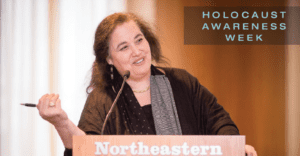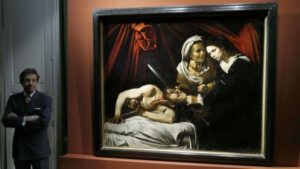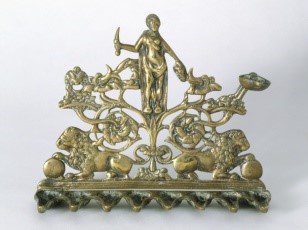A message from Lori Lefkovitz, Ruderman Professor of Jewish Studies and Director of the Jewish Studies Program

Dear Haverim (Friends):
Last week, newspapers headlined the discovery of a newly recovered masterpiece depicting Judith beheading Holofernes, likely the work of the sixteenth-century artist, Caravaggio. For me, the news came as if on cue. The day before, I had delivered a lecture at York University in Toronto that I call “Bedrooms and Battlefields.” The lecture features a slide show of paintings, including many magnificently vivid representations of the apocrypha’s Judith in the act of slicing off the head of the enemy’s general (among them one by Caravaggio), as well as other favorite topics of classical art: Esther pleading before King Ahasuerus; Yael driving a tent pin through the temple of the enemy general, Sisera; and Delilah cradling a supine Samson as the locks that give him his strength are about to be shorn.
Students who have studied Bible with me and who read this news would have instantly placed the recovered painting within a constellation of favored images and stories in the Western tradition. These sacred stories have long provided rationales for artistic representations of powerful, gorgeous, adorned, and often part-naked women defeating a famously strong man in the bedroom: the biblical battlefield where men always lose. These stories about “losing your head” to a woman are about seduction and sexual power reversals, and they are so pervasive that their implications seems natural. They have worn a rut in the cultural psyche and carry a message that remains consequential to this day, whether in the characterization of “princesses” on campus, who are materialistic and can’t be trusted, or in characterizations of women on the campaign trail.
A Northeastern University education prides itself on the “experiential liberal arts,” which inspires students to bring their academic research and skills of critical analysis to real-world situations. Students in my Jewish Religion and Culture course know that the story of Judith was, for a long time and in many Jewish communities, as much associated with Hanukkah as the story of the Maccabees and that Judith was often the featured figure on the menorah. While they write three research papers over the semester, in the Northeastern spirit, they also are required to write three short summaries of experiences of living Judaism that they have beyond the classroom, expressions of Jewish life outside of their experience. Associate Director of Jewish Studies, Jenny Sartori, takes her students on fieldtrips to the mikvah (ritual bath) and to the Vilna Shul.
As I peruse this issue of Haverim, reading the accomplishments of our extraordinary colleagues and students in Jewish Studies, I am again overwhelmed by not only the fascinating variety and breadth of their work and interests but also by the distinctiveness of our program. Over the course of a brilliant career, Stephen Sadow has brought to our students his deep friendships with Latin American Jewish poets and artists, whose work he has made universally accessible on the web. Graduate Jillian Hinderliter is pursuing a doctorate to extend work that she began in our program to inquire into the reasons for the disproportionate contributions of Jewish women to women’s health. Student Nadav David is working on how to improve Jewish social entrepreneurship. The distinguished career of the new Chair of our journalism program has had a sustained focus on Jewish identity and world affairs. Faculty members, such as Phil Brown, whose main work is in sociology and health science, manage to have a side expertise in the Jewish Catskills. Journalism professor Jim Ross’s newest book looks squarely at the place of the Jews in the imagination of China today, where Jews are admired as representatives of another ancient civilization as well as for stereotypes (such as business sense) that in other times and places justified anti-Semitism.
This year, under the leadership of Associate Director of Jewish Studies Laurel Leff, our week of Holocaust Awareness programs was organized around the theme of the slave labor camp experience, with extraordinary programs that drew large, fascinated audiences from campus and beyond. Our Israel Studies annual lecture featured Derek Penslar of Oxford University, who taught us about his research into how Theodor Herzl’s life, character, and personality contributed to his having become the father of modern Zionism. The presence of Dov Waxman, our Israel Studies Professor, who now assumes the Stotsky Professorship in Jewish Historical and Cultural Studies recently held by Laurel Leff, has immensely enriched and broadened our offerings.
Professor Waxman and I are preparing to take twenty-two students to Israel, May 9th-June 9th, through Northeastern’s Dialogue of Civilization program, perhaps the epitome of experiential liberal arts. This year, our Israel program will focus on the Israel-Palestine conflict. We will teach about competing narratives, hearing a wide range of points of view and visiting modern and historic sites and the holy places of the world religions that hold this land sacred. While Dov will teach about modern Israel and the conflict from his expertise as a political scientist, I will teach contemporary Israeli literature. We will travel and read widely, listen closely and bring to Israel the Northeastern commitment to respectful attention, open-minds and open hearts that we hope can encourage a new generation to commit itself to the time-honored Jewish value of repairing the world.
More personally, as I write this note, I have just made my kitchen kosher for Passover, and as I lined the shelves, I thought of the generations before me: my mother and grandmother, cleaning in this season of renewal, and my grandfather, who led my childhood seders, switching between Hebrew and Yiddish; I remember the stories my father shared about his personal liberation from Buchenwald, and my mother’s stories about secretly baking matzah in Siberia. My personal history teaches me that the world turns on a dime, for ill and for good. In this flowering season in which Jews world over reflect on hope and liberation, I feel grateful to my colleagues, especially those on the Jewish Studies executive committee, whose dedication, wisdom, intellectual contributions, and collegiality seem to me unparalleled. We are all grateful to the staff and administration, and to you, who support the vital work of our educational mission. The customary wish for Passover is that it be “sweet.” I wish us all a sweet spring and revitalizing summer.
Lori Lefkovitz
Ruderman Professor of Jewish Studies
Director, Humanities Center and Jewish Studies Program
Read the rest of the Spring 2016 Haverim Newsletter here.





